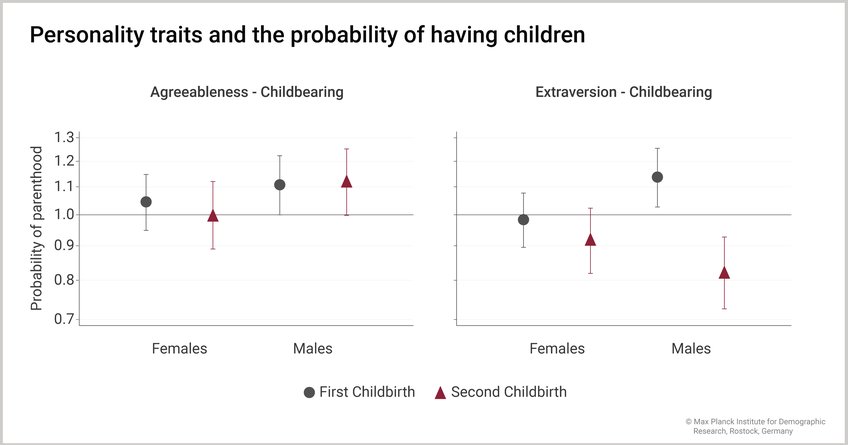A study analyzes the complex the relationship between personality and parenthood
The decline in birth rates in many industrialized countries since the mid-1950s is partly due to a change in values. People decide more individually whether they want to have children or not. Steffen Peters of the Max Planck Institute for Demographic Research has investigated the role played by personality traits such as empathy or extroversion.
A variety of social, cultural, and political factors influence the likelihood of having children. This complexity makes it difficult to study whether and under what circumstances people choose to have children. Another contributing factor is the theory of the second demographic transition. According to this theory, the demographic transition that has been observed in many industrialized countries since the mid-1950s is due in part to a shift in values toward post-materialistic and individualistic values. In other words, mindsets around self-realization, personal freedoms, and self-fulfillment contribute to fertility. This in turn has consequences: If people make intentional individual decisions about whether to have children, it is reasonable to assume that personality traits play a role in the decision.
This hypothesis is the starting point of a research project by Steffen Peters of the Max Planck Institute for Demographic Research. For a study published in the journal Genus, he used the so-called five-factor model to measure empathy, conscientiousness, extroversion, neuroticism and openness to experience. He applied this model to data from the German Socio-Economic Panel (SOEP), one of the largest representative household surveys in Germany.

Men with the personality trait "Agreeability" are more likely to have a first child. The personality trait "extroversion" has a positive effect on the probability of having a first child, especially for men - but a negative effect on the probability of having a second child.
© MPIDR
Peters found that there is a slightly positive correlation between the personality trait "empathy" and the probability of having a child. The traits "conscientiousness" and "neuroticism", on the other hand, are not associated with the likelihood of having a child at all. He found the clearest correlation with extroversion: in men, this trait tended to be positively associated with the first birth, but significantly negatively associated with the birth of a second child. However, the researcher did not find any association between extroversion and the likelihood of having a first or second child among women. This result contradicts findings of other studies that establish this relationship for both men and women.
In his paper, Steffen Peters offers some reflections that indicate how complex the relationship between personality and the likelihood of having a first or second child can be. Since extroverts are by definition outgoing, they may have a higher chance of meeting a potential partner, which in turn may improve their chances of parenthood. However, because the birth of a child greatly reduces a parent's social life, extroverts who become parents may experience a life that is no longer what they intended for themselves. Social activities with friends tend to be limited for parents, and they are more likely to use their available time for child care. This social isolation can lead to dissatisfaction, especially among extroverts, which may lead them to decide not to have another child.
It is also important to consider that personality changes can occur throughout life. For example, while the birth of a first child may be a major life event and may be associated with changes in personality traits, the birth of a second child may have less of an impact on personality traits because of the established routines of daily life.
This article was first published on July 4, 2023, in the newsletter Demografische Forschung aus Erster Hand. The Newsletter is available in German only. "Demografische Forschung Aus Erster Hand" is a joint publication of the Max Planck Institute for demographic Research (MPIDR), the Rostocker Zentrum zur Erforschung des Demografischen Wandels (RZ), the Vienna Institute of Demography (VID), the Wittgenstein Centre for Demography and Global Human Capital and the Federal Institute for Population Research (BiB).






